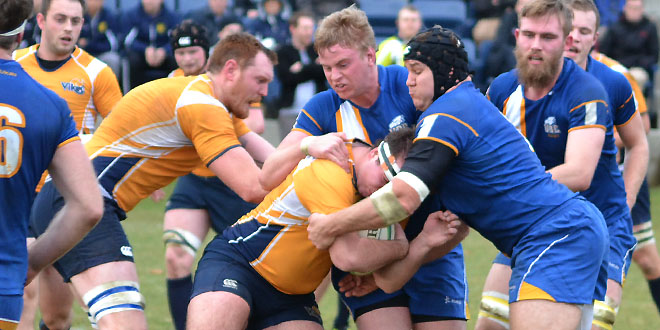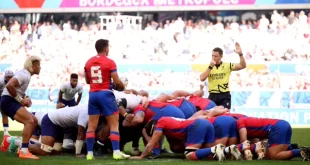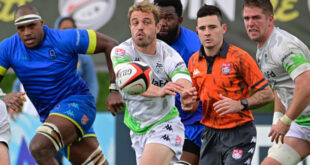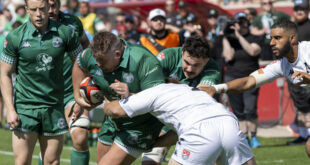Canadian rugby could be on the verge of a significant milestone on November as a joint announcement last week confirmed an initiative to hold a Canadian Men’s University Rugby Championship in November of this year. The event is set to be hosted by Guelph University, located approximately 100 km west of downtown Toronto, with six teams to compete from November 16 to 19 for the inaugural title.
University rugby has proved the most significant breeding ground for Canada’s highly successful women’s rugby programs and currently enjoys full U SPORTS (formerly CIAU / CIS) status throughout the country with the National Championship used as a launching pad for numerous international careers. Men’s rugby, however, does not enjoy the same status.
While Ontario (OUA) and Quebec (RSEQ) each have provincial varsity competitions, elsewhere men’s rugby is categorized as a club sport with little financial support available from their institutions. Notable exceptions to this are traditional powerhouses UBC and the University of Victoria (UVic) who, while considered varsity programs, compete in BC’s CDI Premier League club competition.
The lack of national recognition is seen as a major shortcoming of Canadian men’s rugby and should the tournament come to fruition as planned its impact would be significant. A successful event would put pressure on U SPORTS – currently headed by former Rugby Canada CEO Graham Brown – to make a more significant push towards integrating men’s rugby in its national competition calendar.
Spearheading the idea to lift the status of men’s rugby are organizing committee co-chairs Jeff Chan and Keith Labbett, both passionate supports of Canadian university athletics. Chan says that men’s rugby was an obvious candidate for promotion.
“About 18 months ago, I mentioned to Keith that there was a glaring omission in the U SPORTS lineup of sports and championships. We started to organically test this with a number of people in the local rugby world, largely through Keith’s contacts. We then went to Graham as the relatively new CEO of CIS then U SPORTS. I had previously worked with the CIAU and CIS chairing the Vanier Cup and know many of the players there.
“Our thoughts were consistent with his goal of adding more sports to the fold, and with his blessing we continued to develop a concept. We then brought [UVic Coach] Doug Tate and [Canadian Rugby Foundation Chairman] Mike Holmes into the conversations, and more recently – after discussions with [CEO] Allen Vansen at Rugby Canada – [GM] Jim Dixon. Having gotten the concept down, we approached three schools as potential hosts and decided on Guelph who have been extremely supportive.”
Chan concedes that while the project has received endorsements from both Rugby Canada and U SPORTS there remain financial obstacles. To that end the Canadian Rugby Foundation has pledged an annual grant of $20,000 to help offset costs, while additional sponsors are being sought to minimize expenses required to be covered by participating teams.
By far the most significant expense for the tournament will be travel, with teams expected from both British Columbia and the Maritimes. In fact there will likely be two teams from BC participating. Defending Rounsefell Cup Champions UBC will play UVic with the winner earning an automatic berth in the finals, and the loser moving on to a Canada West qualifying tournament to be held in Kelowna.
Other spots will come from the OUA and RSEQ, with the Maritime University champions representing the Atlantic University Sports (AUS) conference. Guelph are guaranteed a place as hosts. Should they repeat as OUA champions the sixth spot would go to the losing OUA finalist.
The schedule itself will be grueling. The teams will be placed into two pools:
A – Canada West 1, RSEQ, OUA 2 (or Guelph)
B – OUA 1, Canada West 2, AUS
Teams will play two 60-minute pool matches between November 16 and 18. The finals will be played on November 19 and will be a full 80 minutes.
The long-term goal is obvious – to push men’s rugby into mainstream varsity status throughout the country. Such an achievement could pay significant dividends down the road for the sport, with greater financial support pushing development for coaches, athletes, and match officials. It will also enhance rugby’s visibility to the casual sports fan. Chan says the obstacles to U SPORTS inclusion relate to both finance and policy.
“That’s our vision – to evolve Men’s Rugby in the same way as the university football and the Canadian College Bowl evolved. Ironic since rugby pre-dates football. Graham is a a strong supporter of adding a number of varsity sports to the U SPORTS portfolio, not just Men’s Rugby. For example, some NSO’s [National Sport Organizations] such as tennis and golf already organize national university championships and could be added as full U SPORTS sports.
“I don’t want to put words into Graham’s mouth but there probably aren’t any new obstacles. Old barriers include the funding costs for any new varsity sports at the institutional level where all universities are under increasing fiscal pressure, and the desire by some for complete gender parity of U SPORTS participating student-athletes. Adding a new men’s sport doesn’t help that desire, although it obviously isn’t an issue in the OUA. We do not have the same legal requirements as in the USA with the Title IX amendments to the Higher Education Act and the accompanying regulations, but have to recognize the gender equity concerns in Canada.”
In terms of gender equity only three sports are not part of the U SPORTS program for both men and women at national level – football (men only), field hockey (women), and rugby (women). On the surface it suggests that men’s rugby should find a spot beside the women but the significant cost and participation numbers of men’s football far outweighs that of women’s field hockey. Currently there are 27 teams competing nationwide in men’s football with only 13 in women’s field hockey.
Sports offered for both men and women under the U SPORTS banner include: Basketball, Cross-Country, Curling, Ice Hockey, Soccer, Swimming, Track & Field, Volleyball, and Wrestling. All are Olympic sports. In fact the only sport of the above not included in the Olympics is men’s football. Rugby, of course, is played in its seven-a-side version but it remains a close association with former U SPORTS athletes heavily involved Canada’s Bronze Medal-winning side.
It may take longer to push through and significantly more lobbying, but the desire to include men’s rugby in the U SPORTS catalogue is there and this tournament may just provide the necessary impetus to make it happen. With Canada’s National Senior Men’s program struggling to compete against even emerging nations moving towards professionalism, the expansion of its university system as a bridge from junior to senior representative rugby is an essential component for future success.
 Americas Rugby News Rugby news from across the Americas!
Americas Rugby News Rugby news from across the Americas!




